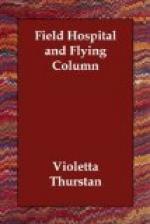Later on the Belgians issued a wonderful little newspaper at irregular intervals of three or four days, typewritten and passed from hand to hand. The most amazing news was published in it, which we always firmly believed, till it was contradicted in the next issue. I collected two or three copies of this paper as a curiosity, but unfortunately lost them later on, with all my papers and luggage. One or two items I remember quite well. One gave a vivid account of how the Queen of Holland had killed her husband because he had allowed the Germans to pass through Maestricht; another even more circumstantial story was that England had declared war on Holland, Holland had submitted at once, and England imposed many stringent conditions, of which I only remember two. One was, that all her trade with Germany should cease at once; secondly, that none of her lighthouses should show light at night.
One of the German surgeons who used to operate at our hospital was particularly ingenious in inventing tortures for me; I used to have to help him in his operations, and he would recount to me with gusto how the English had retreated from Mons, how the Germans were getting nearer and nearer to Paris, how many English killed, wounded and prisoners there were, and so on. One morning he began about the Fleet and said that a great battle was going on in the North Sea, and going very badly for the English. I had two brothers fighting in the North Sea of whom I had no news since the war began, and I could bear it no longer, but fled from the operating-room.
Charleroi and its neighbourhood was just one large German camp, its position on the railway making it a particularly valuable base for them. The proclamations and rules for the behaviour of the inhabitants became daily more and more intolerant. It was forbidden to lock the door, or open the window, or pull down the blinds, or allow your dog out of the house; all German officers were to be saluted—and if there was any doubt, any German soldier was to be saluted, and so on, day after day. One really funny one I wish I could reproduce. It forbade anyone to “wear a menacing look” but it did not say who was to be the judge of this look.




